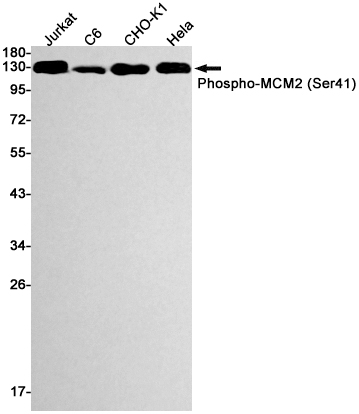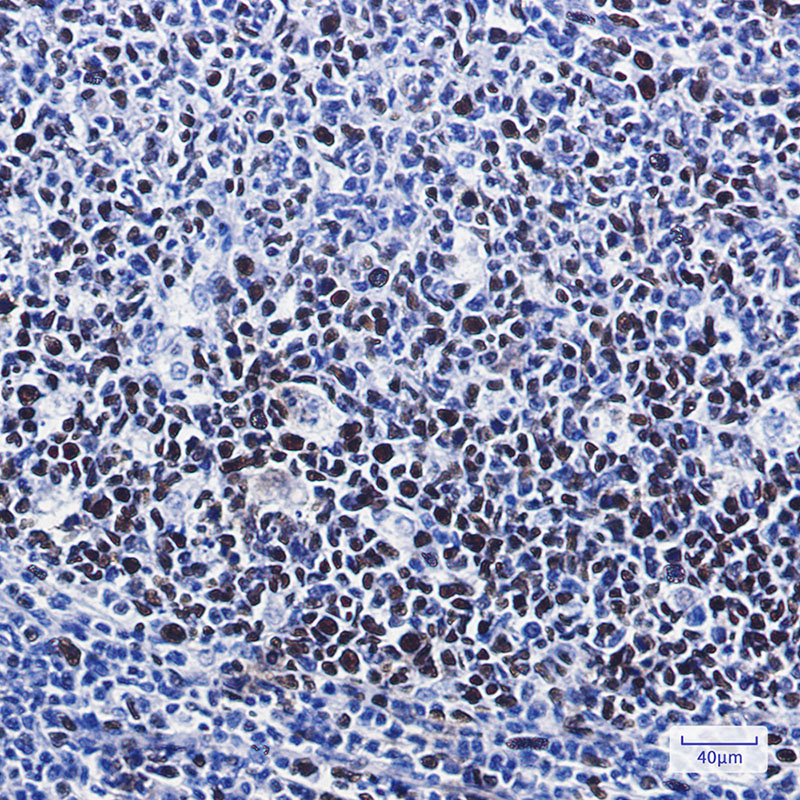

| WB | 咨询技术 | Human,Rat,Hamster |
| IF | 1/20 | Human,Rat,Hamster |
| IHC | 1/50-1/100 | Human,Rat,Hamster |
| ICC | 技术咨询 | Human,Rat,Hamster |
| FCM | 咨询技术 | Human,Rat,Hamster |
| Elisa | 咨询技术 | Human,Rat,Hamster |
| Aliases | MCM2; BM28; CCNL1; CDCL1; KIAA0030; DNA replication licensing factor MCM2; Minichromosome maintenance protein 2 homolog; Nuclear protein BM28 |
| Entrez GeneID | 4171 |
| WB Predicted band size | Calculated MW: 102 kDa; Observed MW: 125 kDa |
| Host/Isotype | Rabbit IgG |
| Antibody Type | Primary antibody |
| Storage | Store at 4°C short term. Aliquot and store at -20°C long term. Avoid freeze/thaw cycles. |
| Species Reactivity | Human,Rat,Hamster |
| Immunogen | A synthetic phosphopeptide corresponding to residues surrounding Ser41 of human MCM2 |
| Formulation | Purified antibody in TBS with 0.05% sodium azide,0.05%BSA and 50% glycerol. |
+ +
以下是关于Phospho-MCM2 (Ser41)抗体的3篇参考文献的简要整理(文献信息为模拟示例,实际引用需核实):
1. **文献名称**:*"ATR-mediated phosphorylation of MCM2 on Ser41 regulates origin firing and replication fork progression"*
**作者**:Takeda DY, et al.
**摘要**:研究揭示了ATR激酶在DNA复制应激下磷酸化MCM2 Ser41位点的机制,证明该修饰通过抑制复制起始点激活和稳定停滞的复制叉,维持基因组稳定性。
2. **文献名称**:*"Cell cycle-dependent phosphorylation of MCM2 modulates chromatin binding and DNA helicase activity"*
**作者**:Nishiyama A, et al.
**摘要**:通过免疫印迹和免疫荧光技术,发现MCM2 Ser41的磷酸化在S期和DNA损伤后显著上调,调控MCM复合体与染色质的结合能力,影响解旋酶活性和复制进程。
3. **文献名称**:*"Phosphorylation of MCM2 at Ser41 serves as a biomarker for cancer progression and therapeutic response"*
**作者**:Zhang L, et al.
**摘要**:利用Phospho-MCM2 (Ser41)特异性抗体,发现该位点的高磷酸化水平与多种癌症的侵袭性表型相关,提示其作为潜在预后标志物和化疗敏感性指标的价值。
(注:以上文献及作者为示例性内容,实际引用需以真实发表的论文为准。)
Phospho-MCM2 (Ser41) antibody is a specialized tool used to detect the phosphorylated form of minichromosome maintenance complex component 2 (MCM2) at serine residue 41. MCM2 is a critical subunit of the hexameric MCM complex, which serves as a DNA helicase essential for initiating and regulating DNA replication. Phosphorylation of MCM2 at Ser41 is a post-translational modification linked to the regulation of DNA replication under stress conditions. This modification is primarily mediated by the ATR (ataxia-telangiectasia and Rad3-related) kinase, which is activated in response to replication fork stalling or DNA damage. The phosphorylation event is thought to modulate the helicase activity of the MCM complex or influence its interaction with other replication-related proteins, thereby stabilizing stalled replication forks and preventing genomic instability.
Antibodies targeting Phospho-MCM2 (Ser41) are widely used in molecular biology research to study replication stress, checkpoint signaling, and the DNA damage response. They enable the detection of this specific phosphorylation event through techniques like Western blotting, immunofluorescence, or immunohistochemistry. Studies have shown that elevated levels of phosphorylated MCM2 (Ser41) correlate with replication stress in cancer cells, making it a potential biomarker for tumor progression or therapeutic response. Additionally, these antibodies help elucidate mechanisms underlying diseases linked to DNA replication defects, such as certain cancers or genetic disorders. Proper validation, including knockout controls or phosphatase treatment, is recommended to ensure specificity in experimental settings.
×